She was arrested as a youth. Her daughter died. He flunked out of college. Look at them now
A 14-year-old girl in downtown San Francisco, wearing kitten heels for the first time, walked into what she thought was her first dance.
When she entered the building, she was confronted by broken glass, dark hallways, an alarm sounding and merchandise strewn around the floor. Scared, she ran to her mother's car — she was waiting outside. Before the girl reached the vehicle, she picked up two pieces of clothing. She put them in the back of the car.
Within seconds, near the back of the car, she suddenly felt paralyzed. Unsure of what to do as she heard a loud, commanding voice next to her.
"Don't move!"
She felt a gun barrel pressed against her right temple, placed there by a San Francisco police officer.
She spent a week in juvenile detention before charges were dismissed prior to a court appearance on theft charges.
Decades later, a successful, thoughtful, confident Black woman shared this story — her story — during the second annual Black Tennessee Storytellers Live event, held last week at the National Museum of African American Music.
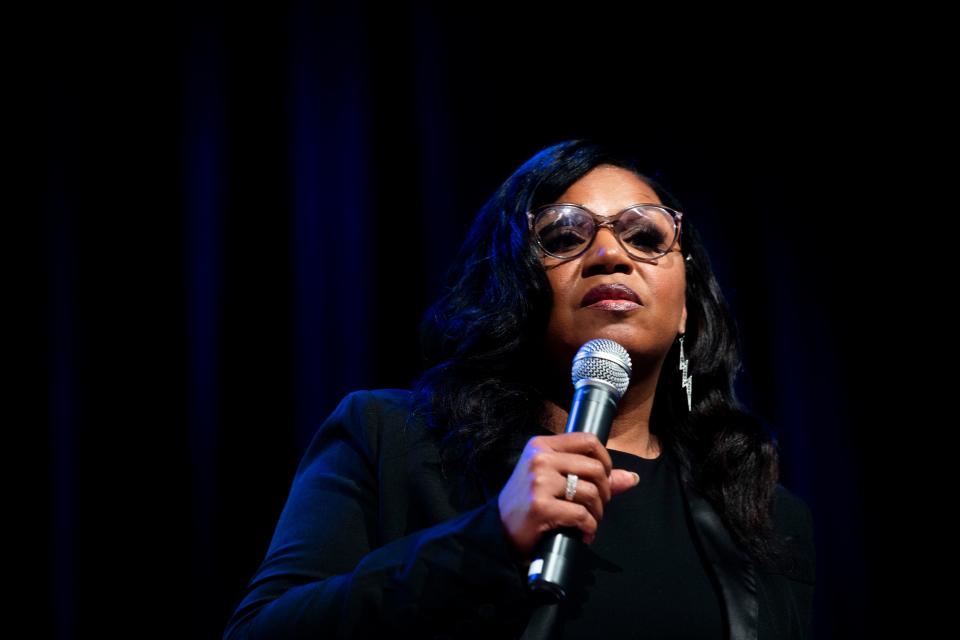
That 14-year-old girl became a police officer. She became a college professor. A chief criminal investigator in the Nashville public defenders office. She became Jill Fitcheard, the executive director of Metro Nashville Community Oversight Board.
Part of her current job at COB is holding police accountable. Not because she resents public safety, but to utilize its resources to better serve her community. Her neighbors. To listen when they claim innocence. As she once did.
Fitcheard was one five Black Middle Tennesseans who shared their stories on stage. Five thought leaders from various backgrounds.
Patricia Bethel: Her daughter's name lives on
Patricia Bethel, a 1972 graduate of Lipscomb University, swore she would never donate a penny to the Nashville school where she experienced racial divide.
Today, she has built a scholarship fund which annually sends students to her alma mater.
The reason is her daughter, Stephanie, also a Lipscomb graduate. She died of lupus in 2017. The scholarship is a family legacy in Nashville.
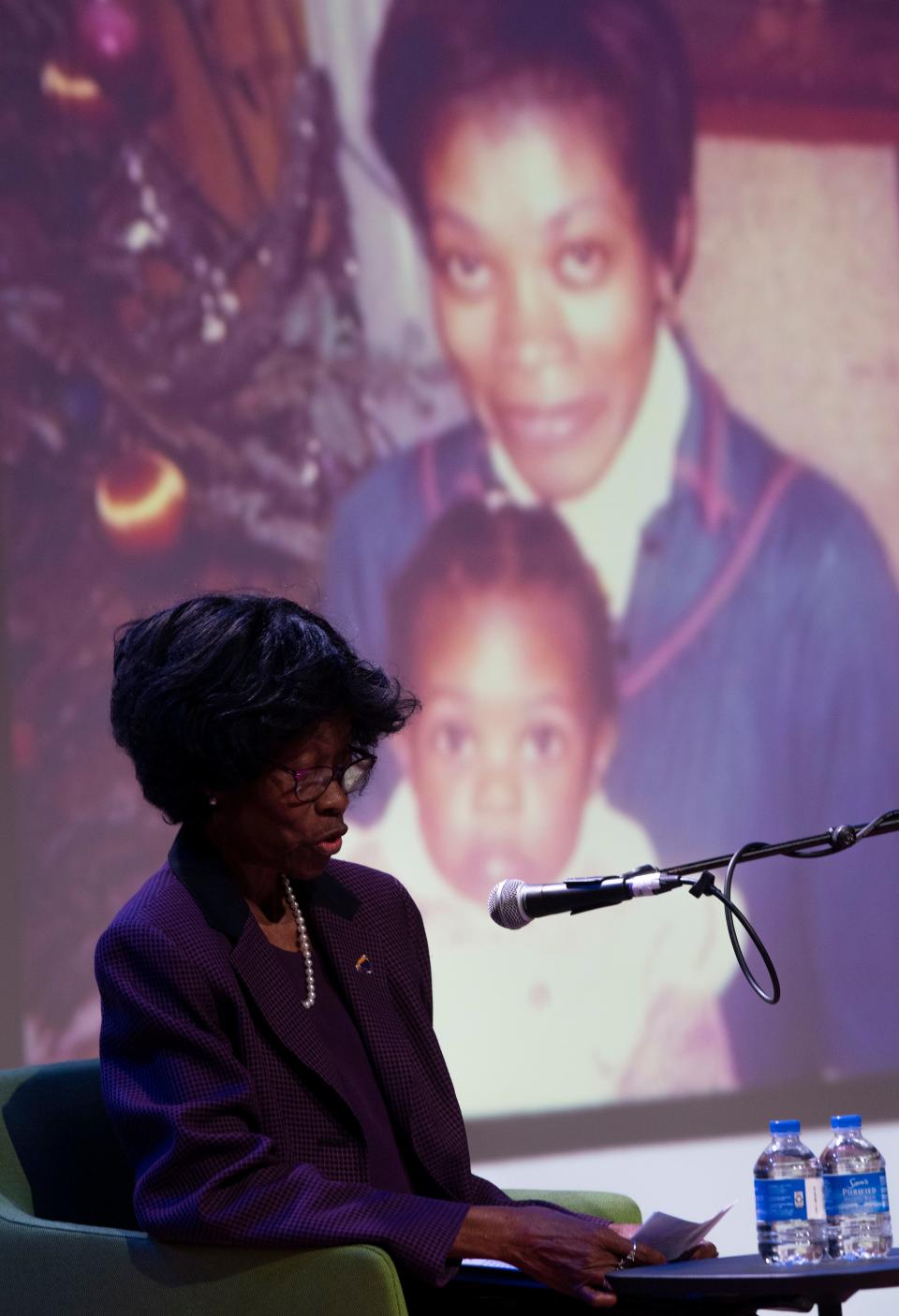
Stephanie was a loving child; always told the truth. She wanted to be lawyer.
Weeks before graduating high school, she was diagnosed with lupus.
Instead of going to college in Maine, starting her journey to become a lawyer, she chose Lipscomb and stayed in Nashville. She eventually became a social worker.
"Stephanie always had a loud voice ... she loved writing and reading," the mother said.
In 2011, the daughter published a book: "Life, Love and Lupus."
It's a constant reminder of Stephanie's struggle with the disease, but also a reminder of the immense talent she displayed.
"She was fearless, whatever she wanted to get done, she just did it," Bethel said.
Then the mom had to watch her daughter die, slowly. Several years ago, she battled grief, trauma and overwhelming sadness as she watched her daughter slowly die.
Through counseling, Bethel discovered hope. She found new hope to keep her daughter's name alive through a scholarship fund. A recent lupus walk in raised $40,000.
"Whatever hard times you're having, the sun will come out tomorrow," said Bethel, who previously served as board chair of the Lipscomb University Black Alumni Council.
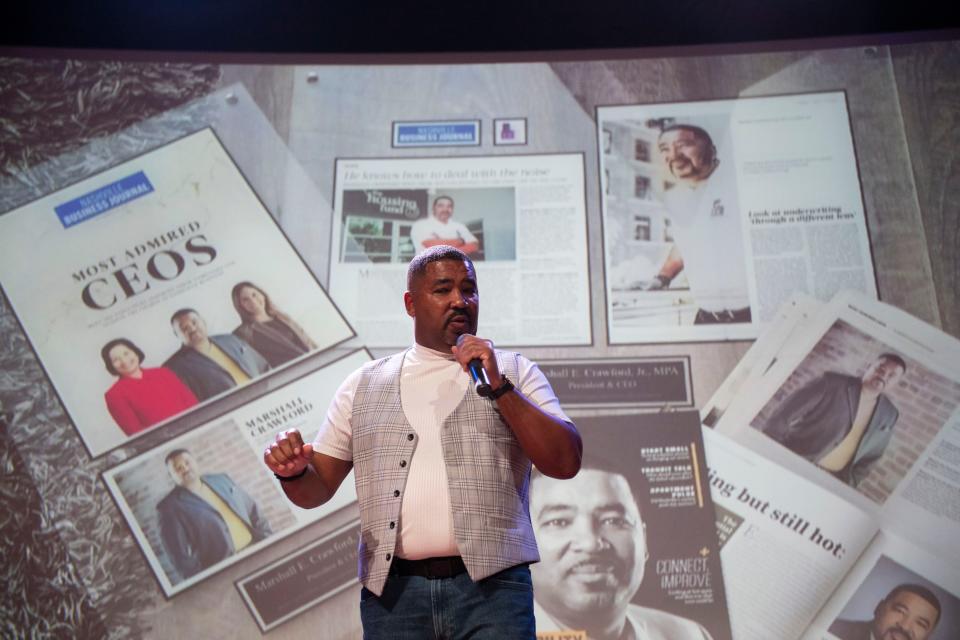
Marshall E. Crawford Jr.: 'Nashville, thank you for taking me'
At age 14, Marshal Crawford was a crossroads in life.
He failed seventh grade. He didn't have a home to call his own. And his family moved from Pennsylvania to Boston to Seattle.
He stole clothes off clotheslines. "That's how I got new clothes," he remembered.
One time, police picked up Crawford and his friends and took them to their family's homes.
After years of sleeping on his grandmother's couch, a family meeting was held. His grandma said someone needed to take Crawford.
He went to live with his uncle. He eventually got accepted to go to college at Penn State. He felt overwhelmed — despite making the dean's list.
"I wasn't adequately prepared for college," Crawford said.
Crawford would flunk out of Penn State. He then enlisted in the military. It changed his life as he sought to atone for the mistakes he made, the adversity he faced.
He read books about Booker T. Washington and Malcolm X in search of atonement.
"As a Man Thinketh" changed his soul. His journey was not always easy.
But emotionally, Crawford needed to mature. The military helped him do just that, even if it wasn't always easy.
"They got a young man that's angry and hurt and mad," Crawford said. "I thought I was better than everybody."
He had to get it together. He had nowhere else to go.
Deployed to Germany, something happened. He was preparing for war. It was all about preparation. Getting ready for anything.
Anger and bitterness left. Support became the norm. Change came for the future CEO. He felt the evolution. He returned to college, this time Western Kentucky. Got a degree in finance after two and a half years. He was better prepared, better disciplined.
"God took me. Western Kentucky took me. Nashville, thank you for taking me," he said.
Crawford started his banking career in 1995 in Nashville before joining the nonprofit sector where has worked for more than 20 years.
In 2017, Marshall joined The Housing Fund, a CDFI private nonprofit revolving loan fund, as president and chief executive officer. For several years, Marshall has been recognized as one of "Nashville’s Most Admired CEOs" by his peers.
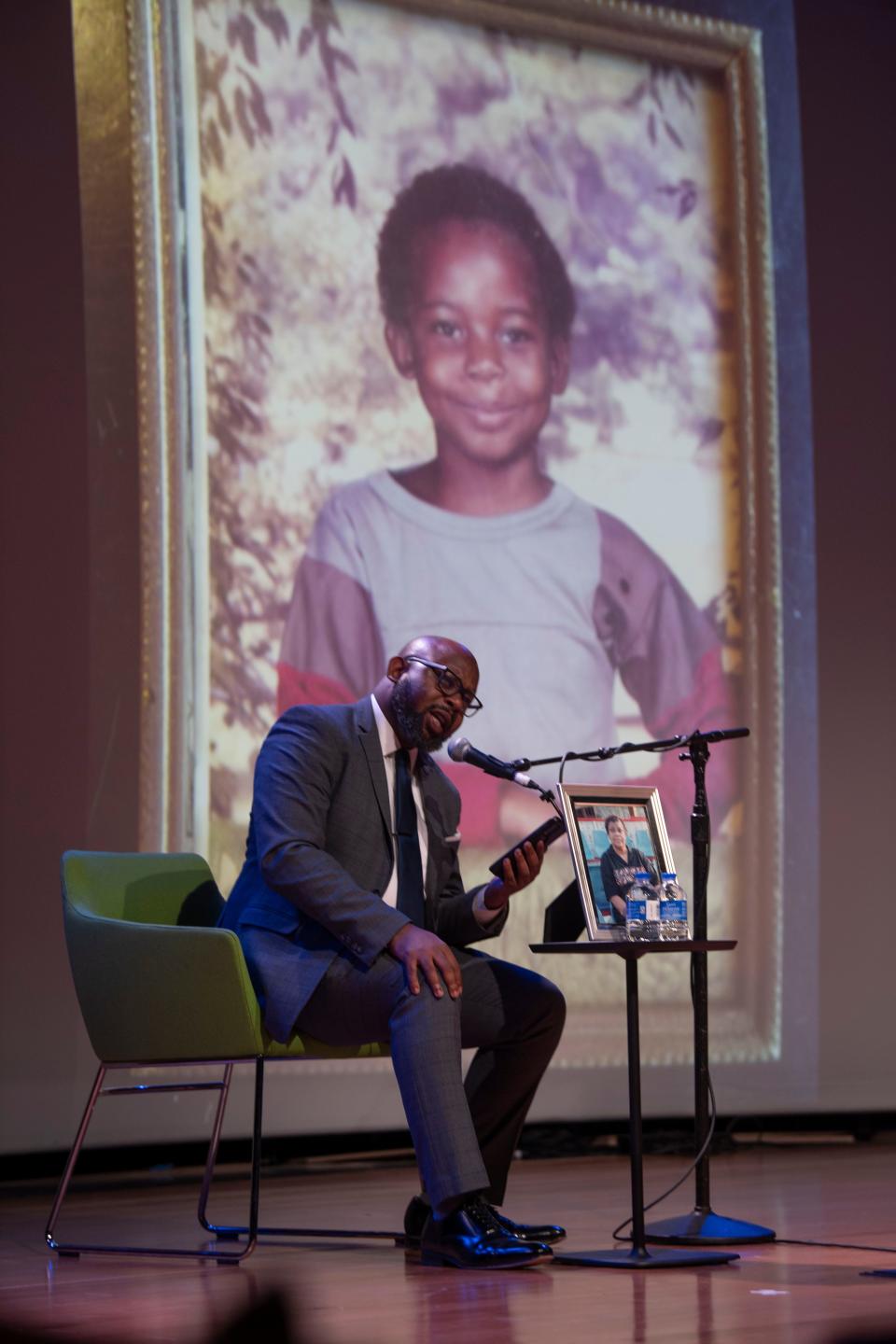
Timothy Hughes: Grandmother taught him secret ingredient in gumbo roux, life
Each year, Timothy Hughes would travel from Baton Rouge to News Roads, a nearby town with a population smaller than its collection of pecan rolls and sugarcane stalks.
Harvest season brought Hughes home, allowing him to learn lessons from his grandmother.
A cup of coffee, the morning newspaper and hums of "When the Saints Go Marching in" brought a smile to Hughes' face.
Visiting his grandmother meant Hughes would get some famous gumbo, made with love.
"Dried bay leaves, freshly cut onions, garlic powder and cayenne pepper swirled like a steaming hurricane," Hughes said.
There was one secret ingredient, one that brought the dish together: gratitude.
It was the life lesson Hughes said he needed to learn, and did, thanks to his grandmother.
The big batch of gumbo was not just for Hughes and his immediate family.
When he was 9, Hughes switched roles, from taste-tester to kitchen help. He was suddenly in charge of assembly to-go bowls for family friends and complete strangers.
By the time the bowls were dished out, there was little left for Hughes and his family.
That was the point.
Gratitude.
"It was the one ingredient that she added to every dish, every day," Hughes said.
Working with his grandmother that summer changed the course of Hughes' life, he said.
"She said to me, baby, no matter what we need, as long as we're together, we will always have enough," Hughes said.
Thirty years after her death, she still teachers Hughes how to live, love, serve and seek.
Those lessons sustain him.
A digital creator and second vice president of the NAACP Nashville branch, Hughes, a Fisk graduate, is an activist, blogger, commentator and columnist working at the intersection of public policy and social justice. He is actively engaged with several local, community-based, grassroots coalitions; as well as several statewide, regional, national, & international organizations
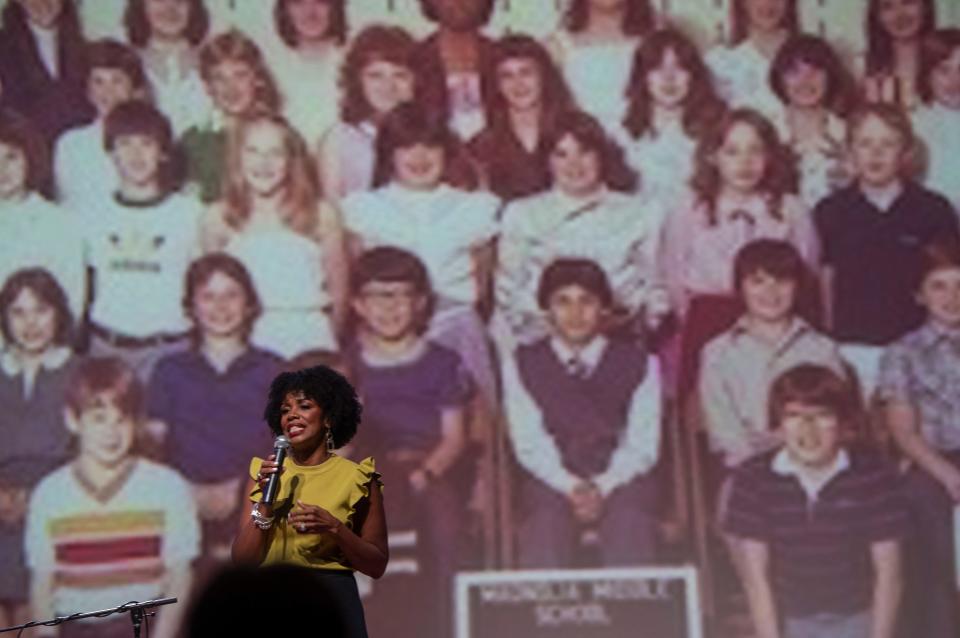
Shanera Williamson
1976: Gathering snacks, sitting next to her sister, she prepared to watch another episode of "Soul Train." The music. The issues. The people and the musical guests.
The vibrant, fancy-dressed folks on TV looked like her; she moved to the rhythm. It was a safe space where she, along with her sister and parents, came together to enjoy something they cherished.
But it was an incubator for Williamson. When she was in school, the first thing she did was search for someone who looked like her. There was one Black child in her class. Chris Williams.
Outside her house, full of love for Black culture, she was surrounded by people who did not fully understand it.
Her parents grew up in a suburb in the segregated South. They strived to give their daughters better.
During a project in class, Williamson was tasked with tracing her oldest living ancestor. She said it was challenging for her and Williams to participate. They said their ancestors arrived in America in chains, not as immigrants.
It wasn't until college when Williamson, who attended Hampton University, a Historically Black College and University, found people who could fully understand her and the challenges she faced as a Black woman.
It was new for Williamson to have a teacher that recognized racism.
Years later, when life brought Williamson and her family to Middle Tennessee, she wanted the best for her three daughters. They settled on Franklin.
Her daughters experienced similar issues she did growing up in the suburbs and not seeing people who looked like them.
Williamson wanted to give her children the best, while making sure they learned about their roots, about America's history of slavery.
The founder of "The Brown Mama Bear Podcast," Williamson uses her platform to support parents raising Black and brown children. She committed to equipping parents with tools to be successful.
Fitcheard: Making it out of the projects
Adversity was a daily norm for Fitcheard, who learned that from growing up in the projects in San Francisco, on welfare, in a housing development run by drugs, violence and gangs. Even police were apprehensive about responding to calls at Geneva Towers. She wanted more. She persisted.
Police accountability work is the biggest challenged she's faced. But it has been rewarding, being an ear and investigative arm for complaints filed by citizens.
"We all have to do this work together," Fitcheard said. "We all play a vital role in this community ... you're that resource for them. We need more love."
Fitcheard is a nationally recognized expert on police reform and certified practitioner of oversight training in investigations, oversight, law enforcement policies and procedures.
Reach reporter Craig Shoup by email at cshoup@gannett.com and on X @Craig_Shoup. To support his work, sign up for a digital subscription to www.tennessean.com.
This article originally appeared on Nashville Tennessean: 5 Black leaders in Nashville share stories of adversity, hope

